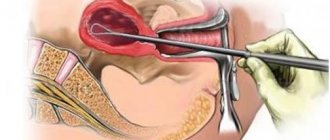Surgical operations on the female genital organs are very complex and traumatic. During such a procedure, the operating room must be completely sterile. The success of treatment and the likelihood of developing unpleasant postoperative consequences largely depend on the accuracy of the surgeon’s actions.
Many women are concerned about sex after curettage . The thing is that intimacy in the first days after surgery can be painful, so doctors recommend abstaining from sexual contact for some time. Let's consider how long after curettage you can have sex.
Is it possible to have sex immediately after curettage?
You should not have sex on the same day as the cleansing. And it doesn’t matter for what purpose it was performed - for diagnosis, termination of pregnancy, or removal of the fetus during a miscarriage. During curettage, the doctor removes the top layer of the mucous membrane of the cervix, which injures the organ. And the period of its recovery takes time. If you have sex on the first day, even more trauma to the uterus will occur. The wound will not heal well, which may result in scarring. And this is dangerous for a woman, as it can lead to infertility.
Scraping - what is it?
The procedure of curettage of the walls of the uterus is one of the methods of abortion and involves the removal of the fertilized egg with the placenta and the surface layer of the endometrium, carried out under general anesthesia. Such a surgical intervention cannot be called complex, but it is a very serious procedure, as a result of which certain complications may arise.
Indications for the procedure
Curettage is prescribed after a thorough gynecological examination. Additional analyzes and studies are also required.
Indications for which curettage is prescribed for therapeutic purposes:
- abortion during pregnancy up to 12 weeks, including medical abortion, as a result of which the fetus did not completely exit the uterus;
- frozen pregnancy;
- complications arising during pregnancy or childbirth in the form of placental abruption;
- presence of cervical pathologies;
- incomplete spontaneous miscarriage;
- endometriosis (if the thickness of the endometrium is increased, that is, hyperplasia is present), adhesions inside the uterus.
For diagnostic purposes, the procedure is prescribed:
- for the diagnosis of tumors and polyps;
- for bleeding between menstruation and during menopause, cycle disorders, prolonged heavy periods;
- when pregnancy does not occur for no apparent reason.
The essence of the operation
When performing curettage, the top layer of the uterine mucosa is removed. The operation is performed as follows:
- anesthesia is administered;
- the doctor inserts a speculum into the vagina, then fixes the cervix;
- using special instruments, the cervical canal is expanded;
- a curette is inserted and curettage is performed.
Why not?
During the procedure, various tissue injuries may occur. For example, to diagnose some diseases, partial curettage is required to collect diagnostic material. After such an intervention, the patient should not have sex for about two weeks. But if a woman undergoes an abortion, then cleaning involves removing the fetus and mucous membrane. This procedure is very traumatic, and tissue healing is slow. Therefore, intimate relationships for a long period of time are not recommended at this time.
That is, sex is contraindicated for women until the uterus is completely restored. In any case, even if you ignore the doctor’s recommendations and start making love earlier, the patient will not experience pleasant sensations. Therefore, it is better to wait until the organ has healed completely.
Resumption of sexual activity
When can you have sex after a uterine curettage procedure? This should be addressed by the attending physician after examining the patient. The uterus must be cleared of blood, tissue particles, and clots. And this requires at least 7-10 days. But the average period is about 2 weeks, although in some cases the doctor sets limits for 1-1.5 months.
You must use a condom. This will not only avoid infection of the delicate mucous membrane, but will also prevent unwanted pregnancy. Fertilization becomes possible approximately 2 weeks after the procedure.
Some women are reluctant to resume sexual activity. Especially if the curettage was associated with the loss of a child. For them, sex is an opportunity to conceive and lose a baby again. This is already a psychological problem, and to solve it, a consultation with a gynecologist is required.
Consequences and complications
After cleaning the uterus, you need to wait some time before restoring sexual intercourse. Otherwise, the woman may experience some complications:
- There is a risk of postoperative infection. The uterus is very sensitive at this time, as its local immunity decreases. Even if a woman is confident in her man, it is better to abstain. After all, pathogenic microorganisms can live on the penis, which do not bring discomfort to a man, and which he does not even know about. And if an infection is introduced into the uterine cavity, inflammation will begin, the treatment of which requires taking antibiotic drugs. And because of them, the intestinal microflora is disrupted, which leads to a decrease in appetite and stool disturbances.
- In addition, premature sex can cause microtrauma to the vagina. They can cause heavy bleeding. In this case, injuries can heal slowly, causing the patient discomfort during urination.
- Injury to the mucous membrane of the cervix. As a result, the healing process slows down. Therefore, if you start having sex earlier, the wound may become larger and bleed. In this case, sexual relations may be prohibited for an even longer period of time.
After restoring sexual activity, a woman may experience some discomfort during the process. As a rule, there is increased dryness, pain and burning. To prevent this, you can use special vaginal lubricants, but they should not contain components that cause a slight burning sensation. Over time, these symptoms should subside. But if this does not happen, you need to consult your gynecologist. This condition may be associated with an inflammatory process. Additional treatment may be required.
Thus, curettage of the uterus is a rather painful procedure, after which sexual rest is necessary. It is also not recommended for a woman to do vaginal douching. Before resuming sexual activity, you should definitely consult a doctor.
Bath and sauna
The next thing you should not do after curettage of the uterus is to visit a bathhouse or sauna. Until the discharge completely stops, you can only take a warm shower.
Why can’t you go to a hot bath after cleansing? The answer to the question lies in physiology. The uterus, injured by curettage, bleeds heavily, which explains the bleeding that accompanies the procedure.
Sudden changes in temperature - a cool waiting room and a hot bath room - can cause additional blood flow to the organ damaged by the procedure. This causes increased discharge, leading to the development of serious bleeding requiring medical attention.
A hot bath is especially dangerous in the first few days after curettage.
What else can't you do? After scraping, saunas are also prohibited. As a rule, these are public areas. After cleansing, a woman’s body is especially susceptible to various types of infections: an open cervix and injured mucous membrane greatly simplify the process of penetration of pathological bacteria to the wound surface. It is not possible to ensure the sterility of wooden surfaces (benches, benches and deck chairs), and in warm and humid conditions, pathogenic bacteria multiply very quickly.
If visiting a bath or sauna after cleaning the uterus cannot be avoided, then the following rules must be followed:
- the maximum time spent in the bath (not too hot) is 25 minutes;
- time spent in the steam room/sauna (at a temperature not exceeding 70° C) – 10 minutes;
- It is not recommended to remove underwear.
Questions
A frozen pregnancy must be terminated. Most often, interruption is performed using the curettage method. After the procedure of curettage of a frozen pregnancy, it is necessary to abstain from vaginal sexual intercourse for at least 1 to 2 weeks. It is this period of time that is necessary for the cervix to close and the entire inner surface of the uterus to heal. The need to refuse sexual intercourse is dictated by the fact that the cervix is literally “open”, and the inner surface of the uterus is a large open wound due to the removal of the upper part of the mucous membrane and parts of the fertilized egg with membranes. As a result of this, pathogenic and opportunistic microorganisms from the vagina can easily penetrate the uterine cavity, and from there into the systemic bloodstream. Bacteria can provoke severe infectious and inflammatory processes in various organs, primarily the genital organs - the uterus, ovaries and tubes. And sexual intercourse will accelerate the penetration of bacteria into the uterine cavity. To prevent infection, it is necessary to abstain from vaginal sexual intercourse for a short period of time until the cervix closes and its inner surface heals. After the wound on the inner surface of the uterus has healed, you can have sex. There are no other restrictions on sexual contacts after a frozen pregnancy. However, within two weeks after curettage for a missed pregnancy, you can engage in oral and anal sexual intercourse. If a frozen pregnancy ends in a spontaneous miscarriage or medical abortion, then it is necessary to abstain from sexual intercourse until the end of bleeding, which can last up to 2 weeks.
Surgical operations on the female genital organs are very complex and traumatic. During such a procedure, the operating room must be completely sterile. The success of treatment and the likelihood of developing unpleasant postoperative consequences largely depend on the accuracy of the surgeon’s actions.
Many women are concerned about sex after curettage. The thing is that intimacy in the first days after surgery can be painful, so doctors recommend abstaining from sexual contact for some time. Let's consider how long after curettage you can have sex.
Other types of sex
After removal of cervical polyps, treatment of endometrial hyperplasia and carrying out abortive measures for several days, you need to abstain from any types of intimacy. This is due to the fact that when scraping the mucous membranes of the uterine cavity in the first days, serious complications are possible - and any stress (even pleasant) is strongly not recommended.
After a couple of days, oral and anal sex are allowed. The main thing is that the partner’s actions are careful and do not provoke the appearance of unpleasant sensations.
Pregnancy after surgery is not advisable during the first three months. Oral contraceptives are often prescribed during therapy. The duration of their use is at least 90 days. Due to this, conception does not occur during an unfavorable period.
Procedure
To understand when you can have intimate life after curettage, you first need to study the features of such a procedure. The uterus is the main reproductive organ of a woman. It consists entirely of muscle tissue, and is covered from the inside with a layer of endometrium. The condition of this mucous tissue directly depends on the menstrual cycle.
If a woman does not become pregnant, the endometrium is spontaneously shed and excreted from the body in the form of menstruation. During the curettage process, the surgeon completely removes the top layer of uterine lining. After this procedure, the endometrium begins to recover rapidly.
The duration of the recovery period of the body directly depends on the type of surgical intervention. The doctor can perform a regular curettage or a separate procedure, when the cervical canal is cleaned first, and only then the uterus. The removed biomaterial is sent for histological examination, which allows doctors to make the most accurate diagnosis.
Hysteroscopy is a procedure similar to curettage, but it is performed using a special hysteroscope device. During the operation, the doctor clearly sees which tissues are affected by pathology and which are absolutely healthy. This allows you to remove only part of the endometrium, reducing the invasiveness of the procedure.
Sex after cleaning using a hysteroscope is possible within a few days. To speed up the process of complete restoration of the uterine mucosa, it is better to perform curettage a few days before the start of menstruation.
Complications
Sex after curettage is prohibited if the patient has any complications. Such side effects from the procedure can cause quite a lot of discomfort. A woman may experience the following pathologies after cleaning:
- Damage or tear to the cervix. Occurs due to careless manipulations of the surgeon. If the tear is not large, it will heal on its own, but severe damage will require a suture.
- Damage to the uterine wall. This complication is also a result of careless use of surgical instruments. If the perforation is large, the uterus will have to be sutured.
- Severe cervical spasm that prevents menstrual blood from leaving the body. In the absence of special treatment, inflammation or infection of the genital organ may occur.
- Inflammatory process in the uterus due to refusal to take antibiotics and poor compliance with sanitary standards during cleaning.
If the surgeon removes too much mucous tissue during curettage, he may damage the growth layer of the endometrium. After such an injury, the endometrium may not recover at all. To avoid unpleasant consequences and return to normal life as quickly as possible, entrust curettage only to an experienced, qualified surgeon. If the doctor strictly follows all the rules and regulations, no complications will arise.
Physical exercise
After cleaning the uterus, you should also not do exercises or physically strain yourself in any other way.
Light exercise can be performed after bleeding has stopped, and regular exercise can be resumed after 1 menstrual cycle.
Significant loads after curettage can only increase pain and activate discharge, increasing its volume. As a result, there is a high probability of large blood loss.
The gynecologist who performed the procedure should tell the woman what can and cannot be done after cleaning the uterus. To avoid postoperative complications, all recommendations must be followed especially strictly.
The procedure for therapeutic and diagnostic curettage of the endometrium is a surgical intervention, as a result of which a histological analysis of the scraping is carried out. Curettage is also performed to remove pathological tumors in the uterine cavity.
Afterwards, you cannot be sexually active for two weeks, since the wall of the uterus during this time only restores its structure. If you have sexual intercourse at an earlier stage, you can introduce an infection into the uterine cavity, which in turn very often leads to the development of unwanted complications in the form of inflammation of the uterine wall and the development of systemic inflammation of the blood. Also, premature sexual relations can provoke cervical rupture, uterine perforation and the development of relapse of the disease.
At first, sexual intercourse may provoke painful sensations. If pain during sex persists for more than two months, you should consult a doctor.
Attention!
The information on the site is presented by specialists, but is for informational purposes only and cannot be used for independent treatment. Be sure to consult your doctor!
Is there an intimate life after curettage? What problems await a woman? How to take care of your health? This article will answer all questions.
Deadlines
Only a gynecologist, after studying your medical history, can tell you how long after curettage you can have sex. The duration of abstinence depends on many factors - indications for cleaning, the quality of the operation performed, as well as the individual characteristics of the patient’s body.
Most often, doctors recommend abstaining from intimacy for 2 weeks. This time is quite enough for the complete restoration of the endometrial layer in the uterine cavity on the cervical canal.
If you have sex earlier, you won't get any pleasure from it. In addition, intimate intimacy will maximize the risk of infection after surgery. Even with a regular partner, it is recommended to have sex with a condom for some time. This way you will preserve the natural microflora of the vagina, which means speeding up the healing process.
The thing is that some diseases of the genital area do not manifest themselves in any way and are not dangerous for a healthy person. However, after surgery on the uterus, they can cause irreparable harm.
Sex after cleaning often leads to microscopic injuries in the vagina. Due to such damage, bleeding may occur when the endometrial layer has not yet fully recovered. Due to the early restoration of intimate relationships with a partner, the patient may experience additional unpleasant symptoms:
- Pain in the lower abdomen;
- Burning during sexual intercourse;
- Feeling of dryness in the vagina.
As a rule, if you follow all the doctor’s recommendations, such symptoms disappear fairly quickly. If several weeks have passed after cleansing and the discomfort does not disappear, be sure to consult a gynecologist about this.
Prevention
In order to prevent the development of complications, it is recommended to temporarily abstain from intimacy, and in the future use barrier contraception. Sexual rest is recommended because the risk of infection entering the reproductive organ during the recovery period increases significantly. In addition, the onset of uterine bleeding cannot be ruled out.
It is also extremely important to restore the normal microflora of the vagina, properly organize your diet, avoid excessive physical activity and monitor your health. If undesirable changes occur, you should immediately tell your doctor about them.
Cleaning the uterus is a serious operation, after which the body needs a lot of time to regenerate damaged tissue. Intimacy during the rehabilitation period temporarily becomes impossible. It is necessary to begin sexual activity only after the mucous membranes have been restored.
Curettage is a serious surgical operation that requires absolute sterility in the operating room and certain surgeon skills. Indications for this operation may vary. This is a therapeutic (medicinal) need or diagnosis of diseases. It may be necessary to cleanse to remove a frozen pregnancy from the uterine cavity. Sometimes curettage is performed to clean the uterine cavity from fetal remains after a spontaneous miscarriage.
Regardless of the reason for curettage, women are often afraid of postoperative reproductive dysfunction. How long after curettage can you have sex? How soon can you get pregnant? Will a woman be able to bear a child? Patients often ask these questions before surgery.
Curettage procedure
Surgery is performed in a hospital using local or general anesthesia. Sometimes anesthesia is used. However, to administer it, the specialist first conducts a conversation with the patient in order to identify her allergic reactions to the drugs.
This type of operation is simple, because the patient stays in the medical center for a day, and then, if there are no complications, goes home. For several days, a woman is required to monitor her heart rate, temperature and discharge.
The curettage procedure is prescribed for various reasons, so the doctor’s decisions about when after curettage you can have sex and whether fertilization will occur vary depending on the individual characteristics of the patient.
Abortion and curettage
Unfortunately, most often in recent years, gynecological cleansing is used to terminate a pregnancy. Girls who decide to have an abortion do not think about its seriousness, although the results can be irreversible. Curettage occurs up to three months, because at a later date abortion is a little more difficult due to the need to remove the remnants of the placenta.
Sometimes, when placental abruption occurs, curettage is performed in the postpartum period to avoid inflammatory processes. Gynecological cleansing is a thorough gynecological operation, and therefore some complications may arise after it. Among them are inflammatory processes of the cervix and its cavity, severe bleeding, instrumental damage to internal organs and infertility. All these indicators can affect the subsequent ability to bear children. Therefore, having sex immediately after curettage is contraindicated.
Sexual abstinence
The required period of abstinence from sexual intercourse is determined individually for the patient by the specialist who performed the procedure. The main indicators are the volume of the operation, the age and health of the woman. However, two weeks are considered general contraindications for having sex after curettage. During this period, the use of tampons, douching and hot baths is also prohibited.
Failure to comply with these points can cause complications. During intimate intimacy after curettage, there is a possible risk of infection, because the mucous membrane of the cervix and its cavity has not yet recovered.
There is no need to think that after surgery and hormonal changes in the body it is impossible to conceive a baby. The ability of the egg to fertilize is restored within three weeks after gynecological cleansing. However, to increase the likelihood of getting pregnant, it is worth waiting a little to allow the body to return to normal.
Precautionary methods when curettage of the uterine cavity
To avoid undesirable consequences during surgery, the patient must be examined initially. They take blood for clotting and do a general analysis. A vaginal smear helps identify infectious diseases of the patient’s genital organs. In the operating room, the anesthesiologist talks with the woman and identifies possible allergic reactions to pain medications. If during the preliminary examination no contraindications for the operation were found, the woman is given anesthesia and the surgeon begins his work. It is very important to maintain sterile conditions throughout the entire operation. After a successful curettage, a period of rehabilitation begins. During this period, the woman herself should worry about her safety. After the operation, it is prohibited to use cotton swabs and hygienic chemicals for the genitals. And an important precaution is sexual relations.
Sex after scraping
The period of sexual abstinence after surgery is determined only by the attending physician and only after examining the patient. The period of recovery of the genital organs depends on the reason for curettage, the health of the patient and the quality of the surgical intervention. On average, after curettage you can have sex, you can have sex only after 2 weeks. This period is due to the need to restore the mucous membrane of the uterus and its cervix. If the mucosa is not restored, then there is a huge risk of unnecessary post-operative infection. Even if you are confident in your sexual partner, you still need to take care and refrain from having sex. There are many diseases of the genital organs that occur in a latent form and do not pose a danger to a healthy body. In the case of a weakened uterine cavity after surgery, the consequences of the above-mentioned infections can be dangerous, and in some cases can even become irreversible. In addition to infection, sex can lead to microtrauma of the vagina. Microtraumas are dangerous because severe bleeding can occur.
After restoring sexual relations, a woman may experience pain, burning, dryness or other types of discomfort. As a rule, these symptoms are considered acceptable and go away very quickly. If you cannot get rid of the unpleasant sensations, then you need to visit your gynecologist. After examination on the chair and based on the results of ultrasound diagnostics, the doctor will give you further recommendations.
To summarize all of the above, I would like to once again remind you of the enormous role of the surgeon in the curettage procedure. The more experienced the surgeon, the less likely there are undesirable consequences after surgery. The body's lack of ability to become pregnant and carry a baby does not in any way threaten a woman's life. But reproductive function is a very important indicator for the happiness of her family. If problems of such a delicate nature arise, then the doors of our clinic are always open for you. The many years of experience and professional development of our medical staff are supported by all the technical base necessary for the diagnosis and treatment of diseases. Our laboratories are constantly replenished with all the reagents necessary for analysis.
Causes of spontaneous abortion
Can sex cause miscarriage? Maybe, if certain circumstances precede this. When planning a new pregnancy, especially after such an event, it is important to exclude all negative factors.
There are several possible reasons for a miscarriage:
- Genetic abnormalities in fetal development. It is for this reason that most miscarriages are recorded. In this case, natural selection occurs: the body ejects an embryo that has pathologies incompatible with life. This may be due to unfavorable environmental conditions, poor-quality food and stressful situations, which affect abnormal changes in germ cells in both men and women.
- Hormonal imbalances.
- The abnormal structure of the uterus is a bicornuate, saddle-shaped uterus. The solution to the problem is made together with a consulting doctor; timely diagnosis and consultation with a doctor increases the chances of successful conception and pregnancy up to 100%.
- Sexually transmitted infectious diseases. Inflamed organs of the reproductive system prevent normal implantation and development of the embryo, which is due to the high probability of infection of the fetus.
- History of multiple abortions. In particular, we are talking about the idea of curettage, which can be performed poorly and damage the functional layer of the endometrium.
- Wrong lifestyle. Excessive physical activity or, on the contrary, a sedentary lifestyle: all this can provoke a miscarriage.
- Taking herbal tinctures and medications without a prescription from a consulting doctor.
In addition, vigorous physical activity can also cause miscarriage. Especially if there was a threat.
General information
The curettage procedure, or curettage as it is called, involves the complete removal of the upper lining layer of the uterus (endometrium). In addition, the cervix is also cleaned, through which the reproductive organ is connected to the vagina. Accordingly, the entire surface, including the cervical canal, is an extensive wound from which blood oozes.
Sexual life after cleansing is prohibited precisely for this reason. Removal of the endometrial layer is performed with a special instrument called a curette. It has sharp edges, and it is with its help that the mucous membrane is removed. When such manipulation is carried out, the organism gives a certain reaction.
The endometrium itself contains a large number of blood vessels, which rupture during the curettage process, resulting in severe bleeding. That is why a woman is advised to have sexual rest after curettage, so that the wound can heal normally and there are no scars left on it.
Physiological consequences
The answer to the question of how long you can’t have sex depends solely on the characteristics of each individual woman’s body and how long it takes for her reproductive organs to recover.
After each termination of pregnancy - medicinal, purging according to indications or spontaneous miscarriage - the woman’s body undergoes some physiological changes.
Let's consider what physiological manifestations can be considered normal. When spontaneous release of the embryo occurs, the uterus begins to bleed. Bleeding may be more profuse than during menstruation, and its duration can reach 4-10 days.
After a miscarriage, this is the norm, especially if cleaning was carried out. As a result of these manipulations, the uterine cavity becomes a real wound. Sometimes the doctor prescribes special medications to stop bleeding. Therefore, if bleeding continues for more than 10 days, you must consult a doctor.
In addition to bleeding, a miscarriage may be accompanied by general weakness and malaise. Some women experience bouts of nausea and faintness. If there is an increase in temperature or fever, it is also necessary to urgently consult a specialist.
Sex life after miscarriage
So, after all the physiological consequences have passed, you can think about resuming your intimate life.
There are no periods of abstinence as such, everything is individual. The doctor decides when you can have sex after a miscarriage. But, in general, experts recommend avoiding sexual intercourse for the first 2-4 weeks.
Important! Recovery involves complete sexual rest.
It is also worth considering that during this period the uterus is open to infections. And even if you sleep only with your husband, that is, a regular sexual partner, there is a risk of infection getting inside the reproductive organ.
Ideally, it is recommended to begin full sexual activity after the onset of a new menstrual cycle - 4-6 weeks - from the moment of interruption. A woman’s genitals are still very sensitive and vulnerable, so at first sex should be “gentle.”











